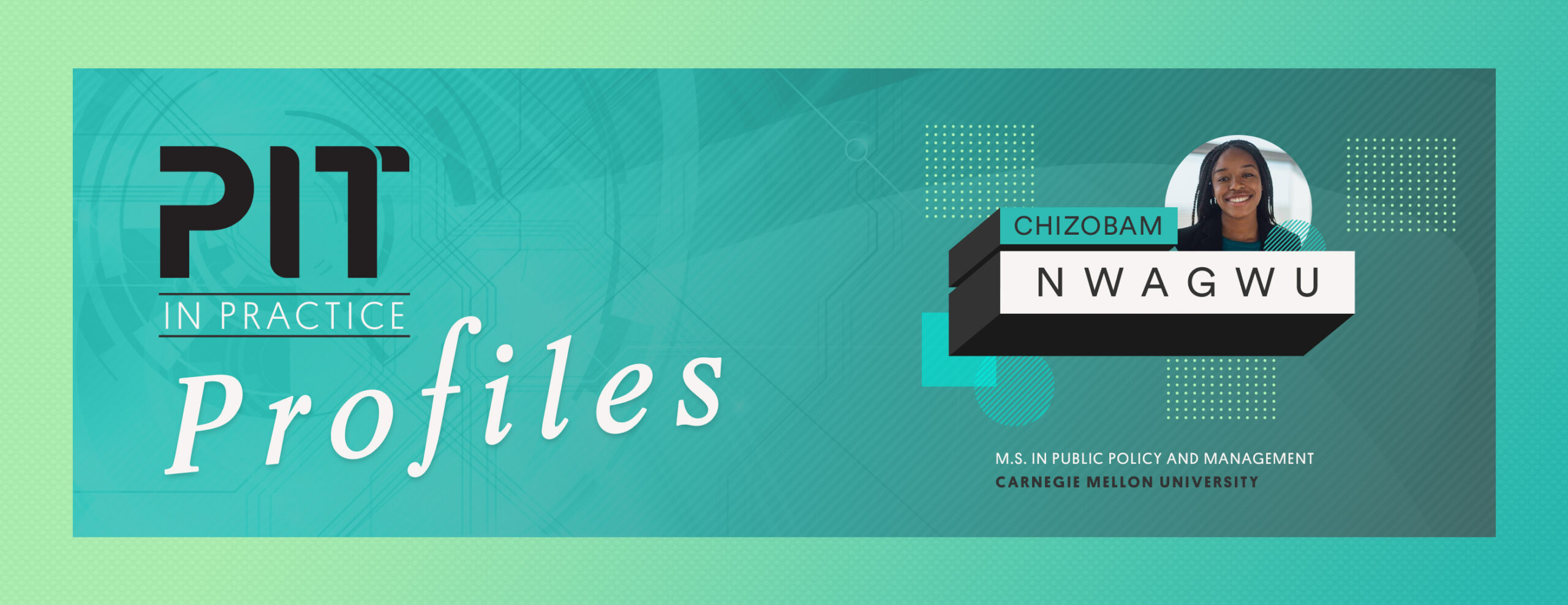PIT In Practice Profiles
In this Q&A series, PIT-UN talks to various technologists and practitioners who are helping define the field to learn about their PIT journey and outlook, in their words.
Member/Grantee
Carnegie Mellon University
Featured Practitioner
Chizobam Nwagwu, a graduate student recent graduate at Carnegie Mellon University, where she studies public policy and management

Q. Tell us about your work in public interest technology. What need or problem does your work address?
Chizobam Nwagwu: In graduate school, I worked on cutting-edge public interest technology projects as a Policy Innovation Lab fellow, a full-time summer and academic year fellowship funded by the New America New Venture Fund. Last summer, I led the user research process to inform our team’s design for an open-source green bond portal, Impact Green, to attract green bond investors for the San Francisco Public Utilities Commission. I gained tangible experience in building thoughtful relationships with ESG [environmental, social, and governance] investors and government partners and crafting an operationally feasible, high-impact digital service product.
In fall 2020, I co-led our team as a project manager to deploy our initial prototype concepts. As a fellow, I’ve had the opportunity to engage in all aspects of product development by leading user research and contributing to the prototype’s user interface and back-end database design, while considering the policy and socioeconomic implications of the projects that we take on.
This past summer, I was selected as a Coding it Forward civic digital fellow. I co-led the redesign of Healthdata.gov, a product owned by the Department of Health and Human Services’ Office of the Chief Data Officer. This experience required me to figure out how best to capture end-user insights into the website’s new design.
Q. Did you set out to create a PIT product?
CN: Although I am early in my career, I am eager for the opportunity to work on PIT products that are tied to systems change. One thing that I learned during my time at Heinz was that systems thinking is vital to the sustainability of this work. As I continue to grow in my understanding of how different systems in our society (transport, housing, access to food) interact, I strive to pursue work that truly embraces the interdisciplinary and complex nature of tackling these problems.
Q. What was a challenge you encountered, or something that surprised you?
CN: A challenge that I have encountered throughout all my projects has been stakeholder management. Our partners are just as important as the solution that we are designing with or for them. One way I maneuvered this challenge is to make clear efforts to understand where our partners/stakeholders are coming from and what directions they had in mind at the beginning.
I also think it is important for us to understand any constraints that may exist on their end for moving a project forward beyond our partnership and how willing they are to seek opportunities for assumptions to be challenged while engaging in a design and research process for the first time.
Q. What advice would you give to other PIT practitioners or students about working in the space?
CN: I definitely recommend that students don’t be afraid to bring your most authentic self to this work! That definitely means engaging in necessary conversations about equity, justice, and bias and how they play into this work as well. I also strongly recommend folks who are interested in public policy to hop on this train as well! Our perspectives are definitely necessary to moving this exciting field even further as well as those from our more technical colleagues.
I definitely recommend that students don’t
be afraid to bring your most authentic self to this work!
Q. What excites you about being a part of PIT?
CN: I definitely find it exciting to be a part of a space within public policy that feels like a movement that is spreading across the country and the world. I definitely am so excited to contribute as a practitioner to work that makes real positive impacts that really put people and the public interest at the center.
